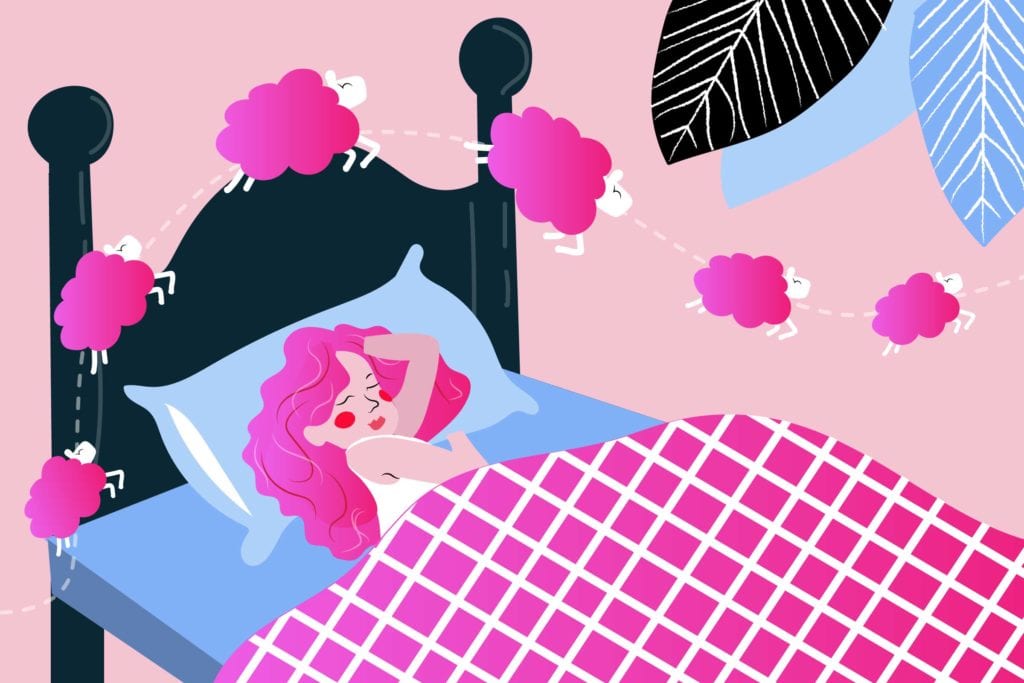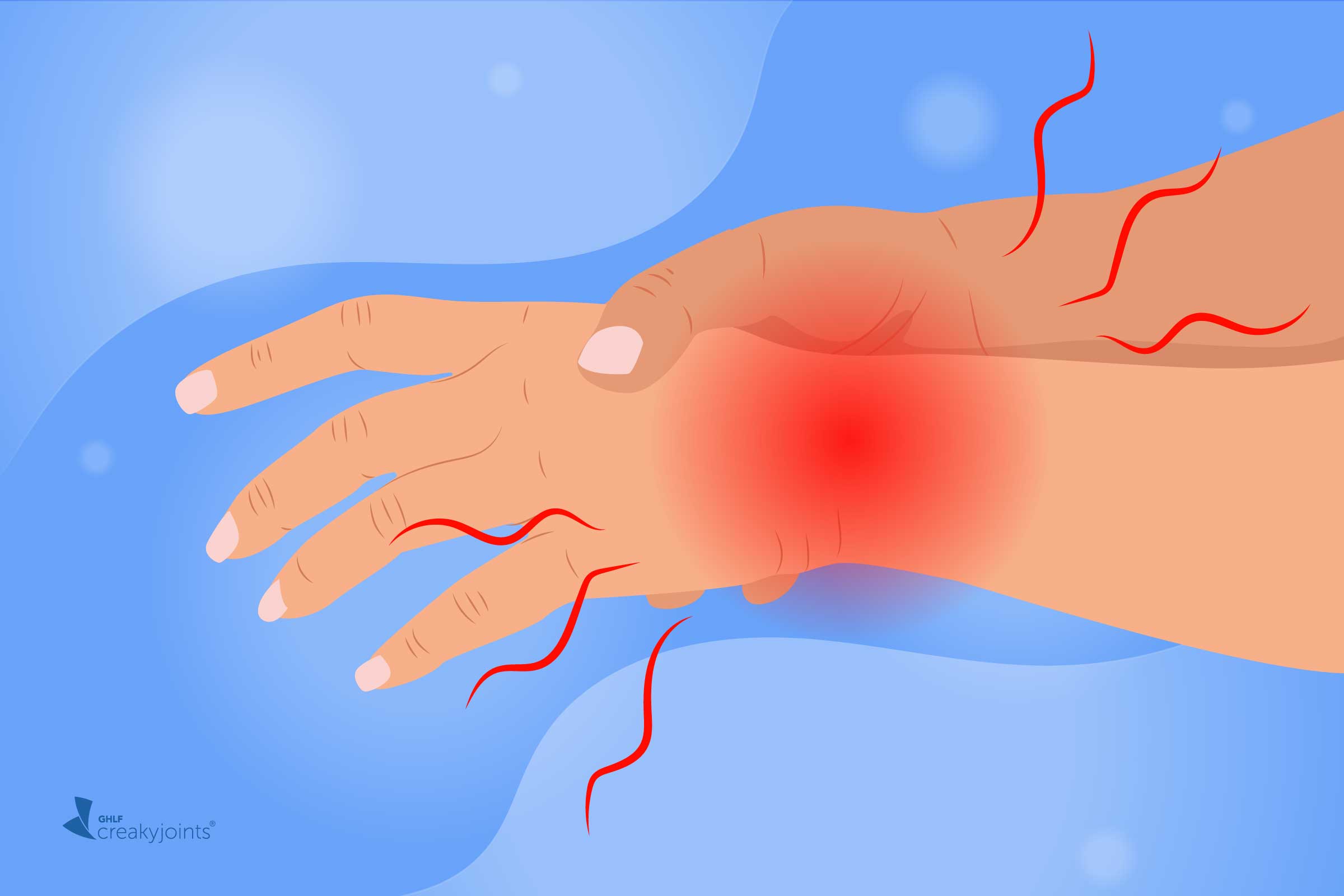

Painsomnia — the inability to sleep due to pain — is a major problem for people with arthritis. As many as 80 percent of patients will have trouble falling and/or staying asleep, and that’s true for people with osteoarthritis or inflammatory types of arthritis.
“The pain from my arthritis was unimaginable, which made it impossible to sleep. Then the feelings of exhaustion due to lack of sleep made everything feel worse, turning into a vicious cycle,” says Kimberly Lackey, whose experiences with reactive arthritis and cancer led her to become a therapist and integrative health coach who specializes in helping people with chronic illnesses.
Not being able to sleep isn’t just painful; it can also feel scary, Lackey says. “I remember lying in bed, fearing that I would be stuck this way and worrying that the pain would never end,” she says. “I would obsess over all the things I did wrong to cause it.” These thoughts only made her insomnia worse. “I learned it was important to focus on the positive.” Sometimes that meant reading inspiring stories or meditating. On bad nights she says she would repeat the phrase “This too shall pass” over and over.
“It can be easy to forget in the darkest part of the night, but your flare-up is temporary. It won’t last forever. It does get better,” she says.
Why Does Arthritis Cause Painsomnia?
The reason people with arthritis are more likely to have sleep issues is likely due to several issues. Your levels of cortisol, a hormone that helps control inflammation, are lower at night. Lying down can cause inflammatory chemicals to pool in the fluid that cushions your joints, which makes them stiffen up. And your perception of pain may be heightened during the nighttime because you’re not distracted by anything else.
But just because painsomnia is normal and common doesn’t mean you have to accept it. Like Lackey, you have to find what works for you to help you get your rest. We talked to people with arthritis about the tricks they’ve learned for getting a good night’s sleep.
Make Your Bed More Comfortable
1. Sleep with a thin pillow
“Sleep problems were actually how I discovered I have osteoarthritis in my neck,” says Nancy B., 52, of Gig Harbor, Washington. For years, all she knew was that lifting her head, even a little, caused terrible pain and a night of no sleep. To keep her neck straight, she slept with the thinnest pillow possible. Last year she started having neck spasms, which lead her to get diagnosed with arthritis. “I’ve had to change a lot of things since my diagnosis, but the flat pillow has stayed. People think I’m weird when they see my sad little pillow — it’s actually a pillow designed for backpacking — but it’s the only way I can sleep without my neck hurting,” she explains.
2. Use a neck roll or towel
When Nancy’s neck is particularly painful, making it so she can’t sleep, she has a small foam neck roll that she places at the base of her neck when she lies down. “The trick is to keep my neck as straight as possible while I sleep so it doesn’t tense up,” she says. She adds that when she travels a small rolled up hand towel can also do the trick.
3. Get creative with your pillows
“When I’m having a bad flare from my rheumatoid arthritis, I put a wedge pillow behind my shoulders, a tube pillow under my knees, and then prop up each arm on a firm bed pillow,” says Elizabeth P., 35, of Minneapolis, Minnesota. “Once I’m in position I can usually fall asleep and stay asleep for at least a few hours.”
Play with the Perfect Temperature
4. Keep your room cold
Heat has proven benefits for helping keep joints limber and in less pain, but hot sleep is often restless sleep. “My rheumatoid arthritis kills my sleep; I can never find a comfortable position without using tons of pillows and pads, but then those things make me too hot,” says Eduardo M., 36, of Mexico City, Mexico. Instead of giving up his beloved heating pad and wedge pillows he now focuses on cooling his bedroom via an open window or air conditioning set to max. On hot summer nights he even uses cold packs placed on his neck and wrists. “For me, the colder the air, the better the sleep,” he says. “It’s strange, my body will feel like it’s on fire, but as long as the room is cold I can still sleep.”
5. Sleep on a heated mattress pad
A heated mattress pad on bottom and a heated blanket on top is Angie K.’s recipe for getting good sleep in spite of her osteoarthritis. The 51-year-old, from Salt Lake City, Utah, says the heat helps her fall asleep, keeps her joints from locking during the night, and wake up with less pain. “I’m basically an electric burrito but it works,” she says.
6. Take a hot bath
A good, warm soak can serve a dual purpose, helping loosen up painful joints and releasing stress, making it the perfect bedtime ritual. “If I have time, I love taking a hot bath to relax before bed,” Angie says. “I’ll soak up the heat as long as possible.”
7. Or sleep with ice packs
“Everyone says heat for arthritis but for me ice is the best, especially if I can’t sleep,” says Jennifer D., 28, of Washington, D.C. “Heat makes the rashes from my psoriatic arthritis feel worse so I have ice packs I keep in the freezer and put them down my pajamas at bedtime. It takes some getting used to but it’s worth it for me to sleep better.” Her trick is to buy ice packs that don’t leak or sweat so she doesn’t wake up in a wet bed.
8. Sleep naked
“Sometimes I just can’t get comfortable enough to fall asleep, especially if I’m feeling too hot,” Jennifer says. So instead of dealing with twisted, hot pajamas she says she often sleeps in the nude. “I’ll just put a thin sheet over the top. If I still need ice packs I use a wide elastic to keep it in place,” she explains.
9. Turn on a fan
Another item Steven swears by for better sleep is his high-powered ceiling fan. “I bought the most powerful one Home Depot sells,” he says. “The cool air on my face and the white noise both help me fall asleep, even if I have pain.”
Get the Right Gear
10. Sleep in compression gloves
Because Elizabeth’s hands are a major sore spot for her, especially at the end of the day when she’s trying to relax before bed, she wears compression gloves. “Sleeping in these gloves makes all the difference. They reduce the throbbing pain and keep my fingers flexible and supported through the night,” she says. Need a recommendation? She prefers these as they are affordable, effective, and you get two pairs — one with fingers and one fingerless so you can still type.
11. Invest in a hospital-style adjustable bed
There are beds that can change positions, like raising the head and knee area, at the touch of a button. “It wasn’t cheap, but buying an adjustable bed was a game changer for me after getting diagnosed with osteoarthritis,” says Steven S., 50, of Toronto, Canada. Before the bed he says he could only sleep in one-hour stretches before becoming so uncomfortable he woke up. Now? “I can sleep all night because I don’t get those ‘pressure spots’ on my joints, it distributes my weight better,” he explains.
Adjust Your Routine
12. Schedule more time for sleep
One of the first thing that Mark M.’s doctor told him when he was diagnosed with psoriatic arthritis was to forget the ‘rule’ that you need seven to eight hours of sleep every night. “I’ve learned that when you have an autoimmune illness you need way more sleep than a normal person,” says the 31-year-old from Katy, Texas. “During flare-ups I really need 12 to 14 hours of sleep per night so I actually put my early bedtime into my calendar. I treat it like an appointment, non-negotiable.”
13. Sneak in an afternoon nap
Another way to give your body the rest it needs to manage your arthritis is to take daytime naps. “If I don’t get enough sleep at night I absolutely will take a quick nap in the afternoon,” Mark says. “I keep a pillow and blanket in my car.”
14. Get exercise during the day
Exercise can feel like the absolute last thing you want to do when you’re in the midst of a painful flare but if you can muster the energy to do some type of movement, it may help improve your sleep length and quality. “I love to swim and try to do it a few times a week, even if I’m hurting,” Mark says. “I do feel like I sleep better after I’ve done my laps. As for it making the exhaustion worse, well, I’m tired all the time anyhow so I might as well be tired doing something productive.”
Consider Treatment Options
15. Rub on an NSAID gel
Eduardo says he tries to stay away from oral pain medications due to the long-term side effects but his doctor recently suggested Voltaren gel, a prescription nonsteroidal anti-inflammatory topical medication. On nights when a pain flare is keeping him awake he rubs the gel into his joints and says it brings almost instant relief, without the same risk of gastrointestinal issues you get from oral NSAIDs.
16. Try melatonin supplements
Melatonin is one of the hormones that helps regulate your sleep cycle. Supplementing with it may help you sleep better. “The RA makes me feel incredibly fatigued but weirdly it also makes it harder to actually fall asleep. I take an herbal melatonin supplement every night before bed, I think it helps me fall asleep faster,” Jennifer says. You should always talk to your doctor before taking any new supplements or vitamins to make sure they are safe for you and won’t interact with any medications you take.
17. Treat acid reflux
Acid reflux can be a side effect of some arthritis medications. Painful heartburn can keep you awake and limit the positions you can sleep in. “My doctor put me on Prilosec for my reflux and that’s made a huge difference in my sleep,” Steven says. Now he says he doesn’t have to worry about keeping his head nearly upright and can sleep in a more comfortable position for his spine.
18. Ask whether sleeping pills are right for you
“There are nights when the pain is much that I just can’t sleep, but lack of sleep is a big trigger for my RA, it was turning into a vicious cycle,” Eduardo says. His doctor prescribed him Ambien, a sleep aid that he only takes when necessary. There are other medication options as well so if your insomnia isn’t responding to anything else, talk to your doctor about a prescription sleep aid, he suggests.
Have You Used ArthritisPower to Manage Your Arthritis?
Join CreakyJoints’ patient-centered research registry and track symptoms like fatigue and pain. Learn more and sign up here.
Keep Reading
If you enjoyed reading this article, you’ll love what our video has to offer.
Subscribe to CreakyJoints
Get the latest arthritis news in your inbox. Sign up for CreakyJoints and hear about the latest research updates and medical news that could affect you.





